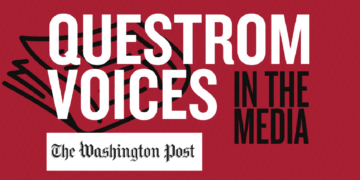The digital landscape continues to evolve at a dizzying pace, and AI is poised to be the biggest game changer yet when it comes to leveraging data, automating processes and engaging customers. The Boston University Questrom School of Business recently brought together industry experts and expert research faculty for a robust discussion on this pivotal topic shaping the future of marketing. Through its Digital Business Institute (DBI), Questrom hosted the 2025 Digital Marketing Symposium, Transforming Customer Engagement: The Power of AI in Personalization.
The event opened with a compelling keynote, Personalization: The Next Competitive Battleground, delivered by David Edelman, former CMO of Aetna, Senior Lecturer at Harvard Business School, and author of Personalized: Customer Strategy in the Age of AI. He emphasized that in an increasingly crowded and digitally saturated marketplace, the ability to deliver deeply personalized experiences is emerging as a key differentiator for brands. Edelman argued that companies that harness AI to tailor interactions, content, and offers at scale are gaining a significant edge, not just in capturing consumer attention, but in building lasting trust and loyalty.

The symposium featured a panel, Academic Perspective on AI, moderated by Pete Howard, Executive Director of Questrom’s Digital Business Institute, with Garrett Johnson, Nina Mazar, and Aaron Kaye from the Marketing faculty. The discussion explored the shift from user-centered platforms to AI-operated systems that may autonomously navigate the web. Central themes included the trade-offs between personalization, privacy, and power. AI often sacrifices accuracy for efficiency, especially when relying on outdated data, raising concerns about reinforcing market imbalances through preset assumptions and limited consumer choice
AI-driven personalization was framed as a competitive necessity, especially on two-sided platforms. While enhancing user experience, it raises ethical concerns around fairness, transparency, and price discrimination. As automation grows, consumer awareness may shrink, shifting more power to platforms. Recommendation systems influence behavior by signaling reputational value through hidden algorithms, while A/B testing often misses long-term impacts.
Privacy discussions revealed generational divides, young users tend to be less protective, perhaps due to digital fluency. Despite GDPR’s influence on corporate practices, perceived user benefits remain limited. A gap persists between privacy concerns and actual behavior, with convenience often winning. Ad-blockers offer some protection but can’t prevent advanced tracking. New blockers aim to balance trust with support for non-intrusive ads.

Misinformation remains a major challenge. While some falsehoods can be flagged, most content exists in gray zones. Crowdsourced credibility ratings may offer promise, but defining “truth” remains fraught. Generative AI is helping small businesses streamline operations. Startups like Voicey are enabling voice-based bots to handle customer service with real-time data access, boosting efficiency in labor-tight environments. The discussion highlighted how digital platforms are being reshaped by AI, user expectations, ethical dilemmas, and shifting market dynamics, underscoring the complex future of personalization and digital trust.
The event concluded with Unleashing the Power of Generative AI, a keynote by Jill Standish, Senior Managing Director of Retail at Accenture. She explored how AI, recommendation systems, and personalization are transforming digital platforms—reshaping customer engagement, boosting efficiency, and maintaining brand authenticity.
Standish emphasized integrating AI with existing systems to improve customer experience, such as showing local inventory. She highlighted the need to balance web design with AI-driven search optimization using concise content and “read more” options. Transparency was a key point, with brands like Estée Lauder praised for using real models to build trust. She encouraged retailers to adopt AI tools for labor and supply chain efficiency and urged educators to prepare students for evolving marketing tech. The message was clear: brands must prioritize efficiency, authenticity, and customer-centricity to thrive in an AI-driven future.

At its core, the 2025 Digital Marketing Symposium aimed to foster critical dialogue at the intersection of technology, ethics, and customer experience. As AI continues to redefine personalization, trust, and engagement, it’s essential to bridge academic insight with industry innovation, ensuring business leaders are prepared not just to adapt, but to lead responsibly. By uniting thought leaders from academia and industry, the Digital Business Institute sought to illuminate AI’s evolving role in marketing and equip leaders to navigate and shape the future of digital engagement.

























